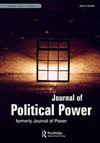Colombian state reactions to peace: the legacies of the narcoguerrilla-narcoterrorist discourses
IF 1.3
Q1 POLITICAL SCIENCE
引用次数: 0
Abstract
ABSTRACT For years, the Colombian state maintained its position about how the guerrillas’ involvement with drug trafficking has made them lose their political and/or ideological nature. Political and military sectors supported this approach and used the term narco-guerrilla or narco-terrorists. The peace process initiated in 2012 during the Santos administration seemed to alter this narrative. This article analyzes how Colombia’s peace process had a contradictory effect on the ‘narco-terrorist’ characterization of the FARC-EP: it opened windows of opportunity both for more peace-prone discourses and for an even more virulent version of the criminalization of the guerrillas.哥伦比亚国家对和平的反应:毒品恐怖主义话语的遗产
摘要多年来,哥伦比亚政府一直坚持游击队参与贩毒使其失去政治和/或意识形态性质的立场。政治和军事部门支持这种做法,并使用了毒品游击队或毒品恐怖分子一词。2012年桑托斯政府时期启动的和平进程似乎改变了这种说法。本文分析了哥伦比亚的和平进程如何对哥伦比亚革命武装力量-人民军的“毒品恐怖分子”定性产生矛盾影响:它为更倾向于和平的言论和更恶毒的游击队定罪打开了机会之窗。
本文章由计算机程序翻译,如有差异,请以英文原文为准。
求助全文
约1分钟内获得全文
求助全文

 求助内容:
求助内容: 应助结果提醒方式:
应助结果提醒方式:


